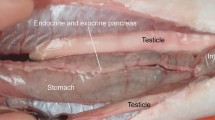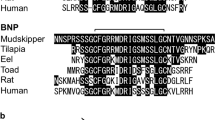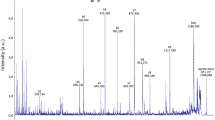Abstract
UP to the present day, no definite endocrine organs have been discovered in any invertebrates, though some evidence of adrenalin production in annelids has been obtained by Gaskell,1 2 and of an internal secretion of the testis in turbellarians by Vandel,3 4 and in oligochæts by Harms.5 The purpose of this letter is to direct attention to the probable endocrine significance of the branchial gland of the cephalopod molluscs.
This is a preview of subscription content, access via your institution
Access options
Subscribe to this journal
Receive 51 print issues and online access
$199.00 per year
only $3.90 per issue
Buy this article
- Purchase on Springer Link
- Instant access to full article PDF
Prices may be subject to local taxes which are calculated during checkout
Similar content being viewed by others
References
Phil. Trans. Roy. Soc., B, 205; 1914.
J. Gen. Physiol., 2; 1919.
C. R. Acad. Sci., 170; 1920.
Bull. Biol. Fr. Belg., 55; 1922.
"Experimentelle Untersuchungen über die innere Secretion der Keimdrüsen " (Jena, 1914).
Rep. Sci. Res. H.M.S. Challenger, Zool., 83; 1895.
Arch. Zool. Exp. Gen. (2), 3; 1885.
Q.J.M.S., 63; 1919.
Arch. Sci. Biol., 1; 1920.
Author information
Authors and Affiliations
Rights and permissions
About this article
Cite this article
HUTCHINSON, G. The Branchial Gland of the Cephalopoda: A Possible Endocrine Organ. Nature 121, 674–675 (1928). https://doi.org/10.1038/121674c0
Issue Date:
DOI: https://doi.org/10.1038/121674c0
This article is cited by
-
The Relationship Between George Evelyn Hutchinson and Vladimir Ivanovic Vernadsky: Roots and Consequences of a Biogeochemical Approach
Journal of the History of Biology (2023)
-
Haemocyanin synthesis and the branchial gland of Octopus
Nature (1974)
-
Elektronenmikroskopische und histochemische Untersuchungen zur Funktion der Branchialdr�se (Parabranchialdr�se) der Cephalopoda
Zeitschrift f�r Zellforschung und Mikroskopische Anatomie (1973)
-
The branchial gland: A site of haemocyanin synthesis in Octopus
Zeitschrift f�r Zellforschung und Mikroskopische Anatomie (1972)
Comments
By submitting a comment you agree to abide by our Terms and Community Guidelines. If you find something abusive or that does not comply with our terms or guidelines please flag it as inappropriate.



